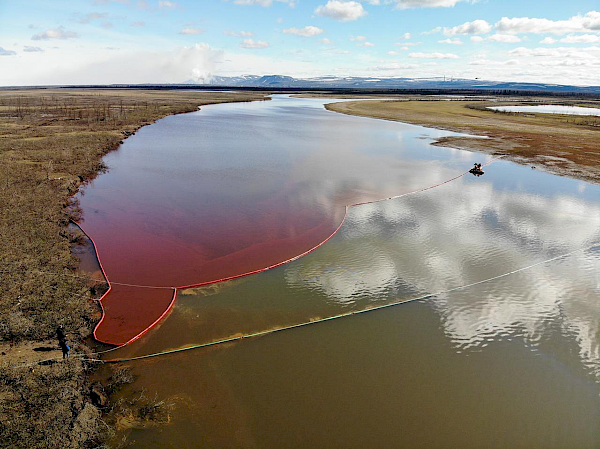
Photo credit: Morpas (Russia’s Marine Rescue Service)
Moscow, June 19, 2020:- On May 29, 20,000 cubic meters of diesel fuel spilled into the Daldykan and Ambarnaya rivers in northern Russia, prompting President Vladimir Putin to declare a national state of emergency. The oil came from damaged fuel tanks belonging to NTEC, an industrial site operated by a subsidiary of Norilsk Nickel.
“The on-going use, transport, or storage of oil-based fuels poses an inherent risk to the Arctic environment”, said Dr Sian Prior, Lead Advisor to the Clean Arctic Alliance. “With the Arctic warming more than twice as fast as the rest of the planet due to climate change, the region’s natural resources – ecosystems and wildlife – are coming under increasing pressure. This cannot continue – the global community must take a precautionary approach to protecting the Arctic’s vulnerable biodiversity in the face of such rapid change.”
“Taking into account the impossibility to completely eliminate the risks of oil spills in the region at the moment and the lack of a solution to eliminate them in the extreme climatic conditions of the North, WWF-Russia proposes completely stopping the use of oil fuels for energy and transport (heavy vehicles and ships) and shift to alternative fuel”, said Dmitry Groshkov, Director, WWF-Russia, in an open letter to Vladimir Potanin, President of Nornickel.
“This spill is a clear example of the need for more effective oil spill prevention and response in the Arctic”, said Jan Dusik, Lead specialist, sustainable development, WWF Arctic Programme. Oil and gas development and operations – be it extraction, shipping or industrial use as in the Norilsk case – must take all precautions to protect ecologically valuable areas, particularly those that contribute to the resilience of Arctic ecosystems and Indigenous livelihoods. The Arctic is a special place with unique ecological and cultural values put at serious risk by expanding industrialization. This major incident underlines the urgency for a transition towards a 100 per cent renewable future in the Arctic, through the replacement of fossil fuels with clean energy sources.” WWF is a member of the Clean Arctic Alliance.
ENDS
Contact:
Dave Walsh, Clean Arctic Alliance Communications Advisor, [email protected] +34 691 826 764
Notes:
Major diesel fuel leak in Russian Arctic threatens vulnerable rivers, lakes, wildlife and Indigenous Peoples , 4 June 2020
WWF Russia: Diesel fuel spill near Norilsk: new stage of the clean-up and need for public control, 15 June 2020
Russian, Foreign Ministry: a serious environmental emergency in the Arctic could undermine Russia’s efforts to develop the region (RU), June 16, 2020
https://tass.ru/politika/8733725
Open letter to Vladimir Potanin, President of Nornickel from WWF Russia
https://wwf.ru/en/resources/news/arctic/otkrytoe-pismo-wwf-rossii-vladimiru-potaninu/
Update 14 July 2020: WWF has not received a response from Norilsk Nickel to its appeals and expects a prompt reaction from the company
About the Clean Arctic Alliance
The following not-for-profit organisations form the Clean Arctic Alliance, which is committed to a ban on HFO as marine fuel in the Arctic:
90 North Unit, Alaska Wilderness League, Bellona, Clean Air Task Force, Green Transition Denmark, Ecology and Development Foundation ECODES, Environmental Investigation Agency, European Climate Foundation, Friends of the Earth US, Greenpeace, Iceland Nature Conservation Association, Nature And Biodiversity Conservation Union, Ocean Conservancy, Pacific Environment, Seas At Risk, Surfrider Foundation Europe, Stand.Earth, Transport & Environment and WWF.
More more information visit https://www.hfofreearctic.org/
Twitter: https://twitter.com/CleanArctic

